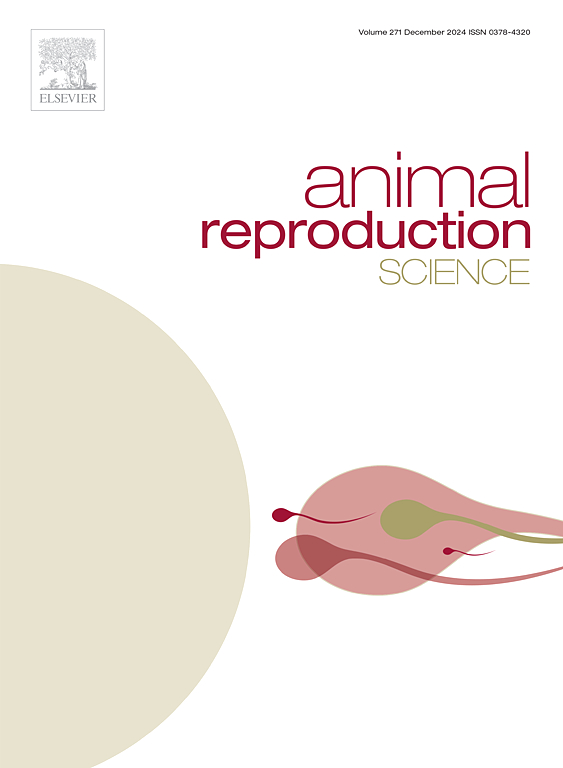Pyometra alters uterine aquaporins related with lipopolysaccharide concentrations and antioxidant enzyme activities in bitches
IF 2.2
2区 农林科学
Q1 AGRICULTURE, DAIRY & ANIMAL SCIENCE
引用次数: 0
Abstract
Pyometra is a common life-threatening inflammatory disease with a complex etiopathogenesis that develops during the diestrus stage and can be observed in elderly intact bitches. The present study evaluated five aquaporin (AQP1, AQP2, AQP3, AQP5, and AQP9) transcript abundances and immunolocalization in the uterine tissue, and investigated their relationship with uterine tissue and blood lipopolysaccharide (LPS) concentration, superoxide dismutase (SOD) and glutathione peroxidase (GPX) activity, and nitric oxide (NO) production in dogs suffering from pyometra. The study sampled 36 client-owned intact bitches from different breeds, of which 24 cases were diagnosed with pyometra. Twelve of these bitches in the diestrus stage that presented for elective ovariohysterectomy were used as the control group. Blood samples were collected into tubes without anticoagulant for serum progesterone, LPS concentration, and antioxidant activities at the time of diagnosis. Bacteriological and tissue samples from the uteri were collected after the ovariohysterectomy. The tissue samples were used to determine antioxidant activity, and hormone and toxin concentrations. Transcript abundance of uterine AQPs were determined by qPCR, and their presence and localization were determined by by immunohistochemistry. For all pyometra samples, the bacteria isolated from the uterine swabs were Escherichia coli. Compared to the control group, AQP1, AQP2, and AQP5 were downregulated more than 2-fold, whereas AQP9 was upregulated nearly 3-fold and AQP3 was upregulated more than 4-fold in the pyometra affected uteri (P<0.05). Uterine AQP1 was moderately negatively correlated with serum LPS concentration (r=-0.568, P<0.01) and tissue NO production (r=-0.407, P<0.05). AQP5 was positively correlated with serum SOD activity (r=0.485, P<0.05) and negatively correlated with serum LPS concentration (r=-0.512, P<0.05). AQP9 was negatively correlated with tissue SOD and serum GPx activity. This is the first study to identify AQP9 transcript abundance and immunolocalization in canine uterine tissue. Uterine AQP1, AQP2, AQP3, AQP5, and AQP9 transcript abundances were altered in spontaneously developed canine pyometra while AQP transcript abundance was negatively related to serum toxin concentration, NO production, and antioxidant enzyme activity. Further studies should be conducted to determine the role of altered abundances of AQPs transcripts in pyometra pathogenesis.
子宫脓肿会改变母犬子宫内与脂多糖浓度和抗氧化酶活性相关的水汽素
子宫脓肿是一种常见的危及生命的炎症性疾病,发病机制复杂,多发生在发情期,也可见于老年母犬。本研究评估了子宫脓肿犬子宫组织中五种水通道蛋白(AQP1、AQP2、AQP3、AQP5 和 AQP9)的转录本丰度和免疫定位,并研究了它们与子宫组织和血液中脂多糖(LPS)浓度、超氧化物歧化酶(SOD)和谷胱甘肽过氧化物酶(GPX)活性以及一氧化氮(NO)产生的关系。该研究对 36 只不同品种的客户饲养的完整母犬进行了采样,其中 24 例被诊断为子宫脓肿。这些母狗中有 12 只处于发情期,并接受了选择性卵巢切除术作为对照组。在确诊时,用不含抗凝剂的试管采集血液样本,以检测血清孕酮、LPS 浓度和抗氧化活性。卵巢切除术后收集子宫细菌和组织样本。组织样本用于测定抗氧化活性、激素和毒素浓度。通过 qPCR 测定子宫 AQPs 的转录丰度,并通过免疫组化确定其存在和定位。在所有脓子宫样本中,从子宫拭子中分离出的细菌均为大肠杆菌。与对照组相比,脓毒症患者子宫内的 AQP1、AQP2 和 AQP5 下调超过 2 倍,而 AQP9 上调近 3 倍,AQP3 上调超过 4 倍(P<0.05)。子宫 AQP1 与血清 LPS 浓度(r=-0.568,P<0.01)和组织 NO 产量(r=-0.407,P<0.05)呈中度负相关。AQP5 与血清 SOD 活性呈正相关(r=0.485,P<0.05),与血清 LPS 浓度呈负相关(r=-0.512,P<0.05)。AQP9 与组织 SOD 和血清 GPx 活性呈负相关。这是首次在犬子宫组织中鉴定 AQP9 转录本丰度和免疫定位的研究。在自发性犬脓毒症中,子宫AQP1、AQP2、AQP3、AQP5和AQP9转录本丰度发生了改变,而AQP转录本丰度与血清毒素浓度、NO生成和抗氧化酶活性呈负相关。应开展进一步研究,以确定AQPs转录本丰度的改变在脓毒症发病机制中的作用。
本文章由计算机程序翻译,如有差异,请以英文原文为准。
求助全文
约1分钟内获得全文
求助全文
来源期刊

Animal Reproduction Science
农林科学-奶制品与动物科学
CiteScore
4.50
自引率
9.10%
发文量
136
审稿时长
54 days
期刊介绍:
Animal Reproduction Science publishes results from studies relating to reproduction and fertility in animals. This includes both fundamental research and applied studies, including management practices that increase our understanding of the biology and manipulation of reproduction. Manuscripts should go into depth in the mechanisms involved in the research reported, rather than a give a mere description of findings. The focus is on animals that are useful to humans including food- and fibre-producing; companion/recreational; captive; and endangered species including zoo animals, but excluding laboratory animals unless the results of the study provide new information that impacts the basic understanding of the biology or manipulation of reproduction.
The journal''s scope includes the study of reproductive physiology and endocrinology, reproductive cycles, natural and artificial control of reproduction, preservation and use of gametes and embryos, pregnancy and parturition, infertility and sterility, diagnostic and therapeutic techniques.
The Editorial Board of Animal Reproduction Science has decided not to publish papers in which there is an exclusive examination of the in vitro development of oocytes and embryos; however, there will be consideration of papers that include in vitro studies where the source of the oocytes and/or development of the embryos beyond the blastocyst stage is part of the experimental design.
 求助内容:
求助内容: 应助结果提醒方式:
应助结果提醒方式:


